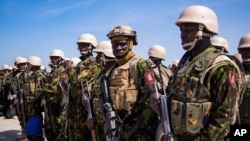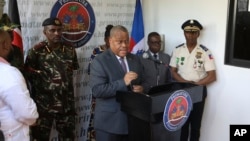Kenyan police arrived in the Haitian capital, Port-au-Prince, Tuesday as part of a U.N.-backed multinational security mission to combat gang violence.
Last July, Kenya offered to head an international force to combat violence in Haiti, where gangs control most of the capital and killings, kidnappings and sexual violence are rampant.
“The people of Haiti deserve to feel safe in their homes, build better lives for their families, and enjoy democratic freedoms. Haiti’s future depends on the return to democratic governance,” U.S. President Joe Biden said in a statement.
“While these goals may not be accomplished overnight, this mission provides the best chance of achieving them,” he said.
More than 580,000 people across the country have been left homeless because of the gangs.
"We hope to see further measurable improvements in security, particularly with respect to access to humanitarian aid and core economic activity,” U.S. State Department spokesperson Matthew Miller said in advance of the arrival of the Kenyan force.
The gangs organized attacks on government infrastructure to prevent former Prime Minister Ariel Henry from returning to the country. They controlled more than two dozen police stations, fired on the main airport and released more than 4,000 inmates from the country’s two largest prisons.
Henry, who was in Kenya when the violence broke out, resigned in late April. A transitional presidential council was formed, choosing U.N. official Garry Conille as prime minister.
Yet conflict continues.
"You did not distribute weapons in working-class neighborhoods," said gang leader Jimmy Cherizier, addressing the new prime minister in a recent video.
"Do not play into the hands of traditional politicians and businessmen, who used violence for political and economic ends, and who now want to recover, by force, the weapons they had distributed. The problem that exists today can only be resolved through dialogue," he added.
Court challenges and decreasing security in Haiti have caused delays in the arrival of the police force.
Before arriving in Haiti, the 400 officers of the first contingent saw a departure ceremony hosted for them.
“This mission is one of the most urgent, important and historic in the history of global solidarity. It is a mission to affirm the universal values of the community of nations, a mission to take a stand for humanity,” Kenyan President William Ruto said.
Biden said he was thankful for the many countries that have promised personnel and financial support “to this mission that will grow to 2,500 multinational personnel, led by Kenya and including Benin, Jamaica, the Bahamas, Belize, Barbados, Antigua and Barbuda, Bangladesh, Algeria, Canada, France, Germany, Trinidad and Tobago, Turkey, the United Kingdom, and Spain.”
He said the U.S. is the mission’s largest financial contributor at $300 million and up to $60 million in equipment.
“What happens in Haiti,” Biden said, “matters to its neighbors, the region, and the world.”
Some organizations and Haitian leaders have welcomed the police force.
"The government and the Haitian people hope this multinational mission will be the last one to help the county stabilize so it can renew its political personnel and return to an effective democracy," said Haitian Prime Minister Conille on X.
“BINUH welcomes the arrival today of a first contingent from Kenya to support the Haitian National Police — it is a crucial step in the fight to restore security in the Haitian capital and its surroundings and protect the rights of Haitians,” the United Nations Integrated Office in Haiti (BINUH) posted on X.
Others are less optimistic. Previous missions have not been successful, leaving allegations of civilians killed, a cholera outbreak and a sexual abuse scandal.
The legal legitimacy of the agreement with the Kenyan government also remains a question.
"The ground for this application is that when the then-prime minister of Haiti was signing this agreement with Kenya, there was no known government in Haiti. The president had been assassinated; there were no elected leaders in Haiti. So, where does he drive the mandate to negotiate an agreement on behalf of his country, Haiti, comes into question," said Wallace Nderu, a lawyer and program officer at the International Commission of Jurists in Kenya (ICJ Kenya), a nongovernmental, nonprofit, member-based organization.
“So, concern is raised that this particular agreement is very secretive. We are not aware of the content of the agreement … it raises the legitimacy of the government deploying the police to Haiti,” he also told VOA, adding the agreements should be sent to the government publication the Kenya Gazette.
The recent arrival would be the fourth notable foreign military intervention in the country.
VOA’s Mariama Diallo contributed to this report. Some information came from The Associated Press and Reuters.






